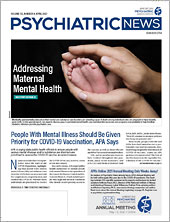A sad truth for survivors of COVID-19 is their increased risk for new-onset psychiatric diagnoses, such as anxiety and dementia, within 90 days of infection. This emerging mental health burden adds to the already heightened levels of grief and bereavement by families who have lost loved ones and other new or worsening psychiatric conditions stemming from the educational, social, and economic instabilities related to the pandemic and subsequent control measures.
As psychiatrists, we are only beginning to fathom the seismic scale of the mental health fallout from COVID-19 and its disproportionate impact on Black, Indigenous, and People of Color (BIPOC) and other marginalized individuals. It’s almost impossible to appreciate the complex layering of devastation across all sectors of our country and harder still to comprehend how these factors amplify each other to disproportionately harm BIPOC communities.
This goes beyond well-being: It’s life and death. According to the Centers for Disease Control and Prevention (CDC), life expectancies for all Americans declined in 2020 by one full year. Examine these statistics more closely and a horrifying truth is revealed: Life expectancies for non-Hispanic Black Americans fell by a staggering two and a half years, exacerbating the preexisting racial disparities in life expectancy. This unconscionable gap underscores how urgently we, as psychiatrists, must advocate to eliminate structural racism in our policies, institutions, and clinical care.
Advocacy is a core professional responsibility for physicians. In 2001, the AMA adopted the “Declaration of Professional Responsibility,” which directs physicians to “advocate for social, economic, educational, and political changes that ameliorate suffering and contribute to human well-being.” As physicians, we must not only help our patients, we must also engage in advocacy to advance community and population health.
Unfortunately, many psychiatrists are ill equipped to advocate. Advocacy is a specific skillset. Advocacy skills are learned, much like clinical skills, through education, modeling, and practice. Traditionally, advocacy competencies have not been taught during either undergraduate or graduate medical education. Although some medical institutions have implemented advocacy curricula, that is the exception, not the rule.
Today’s physician-advocates learn advocacy skills both on the job and through self-directed learning. Many psychiatrists act as advocates during their day-to-day work, such as calling an insurer for authorization of care that has been unfairly denied to a patient or joining a hospital task force to create pathways to access more equitable care.
Advocating outside the realm of patient care—like testifying at a state legislative public hearing—can be daunting. That’s why we are excited to present a session during APA’s online 2021 Annual Meeting titled “The Time for Justice Is Always Now! Engaging in Advocacy as an Early Career Psychiatrist.” This workshop will introduce psychiatrists to a framework for advocacy that can be used to address a range of health equity issues across diverse patient populations, especially at the intersection of social justice and mental health. We will discuss specific examples of advocating for health equity in the context of a structurally oppressive health care system.
While this workshop will educate all psychiatrists, we plan to focus on early career psychiatrists (ECPs). Engaging in advocacy can provide both rewards and challenges for ECPs. ECPs may feel empowered to translate their passionate and committed advocacy efforts to tangible social justice advancement. But because ECPs have recently left the structures of training programs and have yet to become established in their careers and professional networks, they need additional resources, supports, and mentorship as they develop their unique professional identities.
We hope you will consider participating in our session. We hope to inspire you to engage in the urgent advocacy our country needs to eliminate racial disparities, improve health outcomes, and make access to mental health care more equitable for everyone, and especially for BIPOC and other marginalized communities. ■
“The Time for Justice Is Always Now! Engaging in Advocacy as an Early Career Psychiatrist” will be held Saturday, May 1, from 4 p.m. to 5:30 p.m.
References
Taquet M, Luciano S, Geddes JR, Harrison PJ. Bidirectional Associations Between COVID-19 and Psychiatric Disorder: Retrospective Cohort Studies of 62 354 COVID-19 Cases in the USA. The Lancet Psychiatry.

